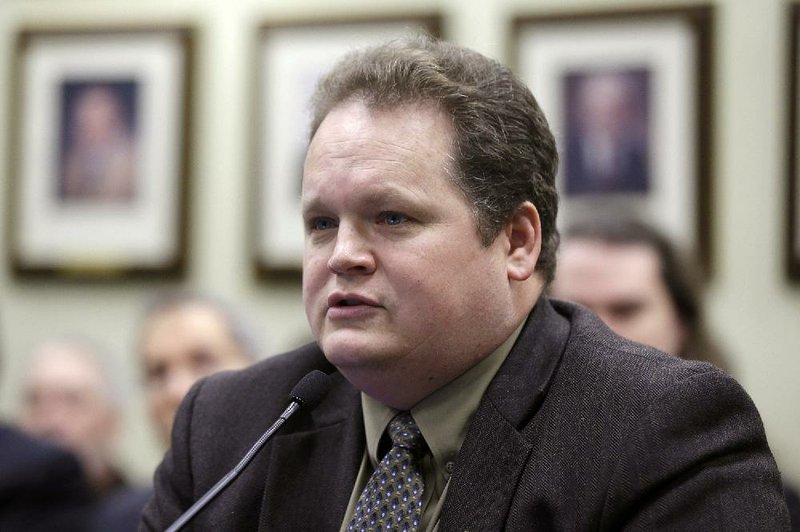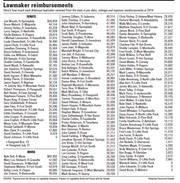The state's payments to state lawmakers for per diem, mileage, travel and office expenses increased by $190,000, or 5 percent, in 2014 over 2012.
Those expenses totaled $4.02 million last year when the Legislature met in a 38-day fiscal session early in the year and a three-day special session in the summer -- up from $3.83 million in 2012 when the General Assembly convened in a 26-day fiscal session, according to the latest state records.
The payments in 2014 fell below the $4.87 million paid out in 2010 when lawmakers convened for their first-ever fiscal session, which lasted 25 days.
The expenses dropped sharply in 2012 from 2010 largely because of a reduction in office-related expenses paid to lawmakers after the April 2012 settlement of a lawsuit that challenged the Legislature's system of reimbursing lawmakers for expenses.
Per diem (a daily allowance for lodging, meals and incidentals), mileage and other payments are in addition to legislators' $15,869 annual salaries. (The House speaker and Senate president pro tempore each get $17,771.) A citizens commission -- authorized under Amendment 94 to the Arkansas Constitution -- has proposed substantial increases in annual pay for state lawmakers, while recommending that lawmakers end certain expense payments.
In 2014, six lawmakers received more than $50,000 in per diem, mileage and other payments, compared with four in 2012 and eight in 2010.
State Rep. Nate Bell, R-Mena, collected the largest among state lawmakers in 2014: $62,902.
"Obviously I live quite a ways from the Capitol, and I am here most of the time," Bell said.
"Back when I was first elected [in 2010], I asked my folks, 'Do you want a representative in Mena or do you want a representative in Little Rock?' And overwhelmingly, my folks said, 'We want you in Little Rock.' I said, 'You need to understand that that is going to mean that I am consistently going to have some of the highest expenses,'" he said.
"Everybody literally unanimously in every one of the town hall meetings said, 'We understand that, and we want you in Little Rock,'" said Bell, who was appointed in January by House Speaker Jeremy Gillam, R-Judsonia, to be chairman of the House State Agencies and Governmental Affairs Committee.
"I believe that it is my job to represent the people, and I do that most effectively when their business is being conducted here by being here," he said.
Bell, who is a cattle and poultry grower, a bail bondsman and a construction consultant, said his "personal income over the time that I have been in the Legislature has averaged $40,000 a year lower than it was prior to my Legislature service.
"That's why I am actually leaving the Legislature at the end of this term is because specifically I can't handle it financially," he said. "There is certainly no one getting rich on legislative service unless they are doing something underhanded, and I am certainly not doing that."
About $10,160 of Bell's expenses were incurred in 2013 but submitted in 2014, a factor that drove up his totals. He also attended a Council of State Governments conference in Alaska in August; an American Legislative Exchange Council meeting in Kansas City in May; and a meeting in Washington, D.C., in December at a cost of about $5,400 to the state.
Bell said he attended those conferences partly because of his interest in energy and environmental issues, and partly to help him prepare to be state chairman for the American Legislative Exchange Council.
The other five lawmakers who collected more than $50,000 in payments in 2014 were Reps. Mary Lou Slinkard, R-Gravette, David Branscum, R-Marshall, Stephanie Malone, R-Fort Smith, Kelley Linck, R-Flippin, and Sen. Jon Woods, R-Springdale.
Usually, lawmakers who draw the most attend more meetings, live farther from Little Rock and go to more out-of-state conferences.
Branscum and Linck said they attended more legislative meetings last year than in previous years to help them prepare to be co-chairman of the Arkansas Legislative Council and chairman of the House Public Health Welfare and Labor Committee, respectively.
Slinkard could not be reached for comment last week. Malone said she didn't have time to answer questions Thursday and could not be reached for comment Friday.
Woods said his legislative expenses show that he spent a lot of time in Little Rock last year preparing complex bills -- including ones on personal identity rights, a child abuse registry, drug courts and ethics -- in preparation for this year's regular session. He said he was able to do that, partly because he wasn't up for re-election last year.
"In order to be effective in government, you have to be part of the discussion and have to be in Little Rock to be part of that discussion," he said.
Woods said the payments that he receives from the state for expenses are "more of a break-even" situation and that any money he receives above his expenses goes to pay for things such as his car expenses or new tires.
"It's not a get-ahead environment. You make enough to make it work," he said.
Last year, he attended the Council of State Governments conference in Alaska in August and the National Conference of State Legislatures at San Diego in June at a total cost of about $4,300.
Woods said he's a full-time state legislator. He said he draws royalties through iTunes based on the work of his band, A Good Fight, and works part time at his business-consulting company.
"It's hard to hold down a private-sector job and be in the Legislature unless you are independently wealthy, or older and retired," said Woods, who formerly worked for Arvest Bank.
As it has done for several years, the Arkansas Democrat-Gazette reviewed records provided by the Bureau of Legislative Research, the Legislative Audit Division, the House of Representatives and the Senate to calculate the amounts of the state expenses payments to lawmakers.
LEGISLATIVE EXPENSES
Lawmakers receive $150 per day for attending meetings in Little Rock, $146 per day for attending meetings in Hot Springs and $129 per day for going to meetings in other Arkansas cities, said Margie Davis, chief fiscal officer for the Bureau of Legislative Research. Before Oct. 1, the rates were $148, $145 and $129 per day, respectively, she said.
Legislators who live within 50 miles of the state Capitol are paid $61 per day and for mileage for attending meetings in Little Rock.
Last year, lawmakers were reimbursed for mileage at a rate of 56 cents per mile, Davis said. The mileage rate increased to 57.5 cents per mile on Jan. 1.
Lawmakers usually have more expenses in odd-numbered years, when the Legislature meets in regular session. Generally, the longer the session, the higher the costs. In 2008, voters amended the state constitution to provide for fiscal sessions in even-numbered years.
Expense payments to lawmakers totaled $3.6 million in 2006 and $4.4 million in 2008, and then increased to $4.8 million in 2010 before dropping to $3.8 million in 2012. Last year, they topped $4 million.
Such payments totaled $3.9 million in 2005, $4.7 million in 2007 and $5.41 million in 2009 before dipping to $5.09 million in 2011. In 2013, they were $4.77 million.
PROPOSED CHANGES
Along with state Rep. Warwick Sabin, D-Little Rock, Woods proposed a constitutional amendment that voters approved in November that is now known as Amendment 94.
The amendment increased the amount of years that lawmakers can serve in the state House, Senate or in both chambers, barred lawmakers from accepting certain gifts such as meals in one-on-one meetings with lobbyists, and created a citizens commission to set elected state officials' salaries.
The resulting Independent Citizens Commission -- whose members were appointed in December by the governor, chief justice and legislative leaders -- has proposed raising the annual salaries of state lawmakers from $15,869 to $39,400. Pay for the House speaker and Senate president pro tempore would increase from $17,771 to $45,000.
The commission also is recommending that the Legislature eliminate office-related expense reimbursements of up to $14,400 a year that lawmakers are eligible to collect under state law. More information about the commission's recommendations is available at www.citizenscommission.ar.gov.
A public hearing on the proposed salary increases is to be held Monday at 10 a.m. in the University of Arkansas Administrative Office at 2404 N. University Ave. in Little Rock.
Representatives' total salaries would increase from $1.58 million to $3.94 million a year, and office reimbursements of $1.16 million a year -- based on a three-year average -- would be eliminated.
Senators' salaries would increase from $557,317 to $1.38 million, and their office reimbursements of $445,000 would be eliminated.
OPINIONS ON RAISES
Bell said the salary commission's proposals wouldn't affect him much.
"If you take into account the tax implications, what you are doing ... is you are taking a reimbursable expense and turning that into income. For most of us, that actually makes the net out of that exchange maybe a $2,000 or $2,500 raise at best," he said.
Bell said he pays Liberty Strategies LLC of Mena -- a company sold by his wife to a longtime family friend Tina Lehman last year -- for various office-related expenses. For instance, he paid the company $1,142 in December for "social media monitoring/maintenance, local news monitoring/events, mail processing, phone calls/messaging/emails and thank you notes," according to House records.
"You are not dealing with a situation where you can just hire anybody off the street to go do this. If you do, you run the risk of not only political exposure in ways you may not want, but you also run the risk of someone's sensitive information, somebody's identity, something that people would be very embarrassed by being out in public [being released]," he said.
The commission's proposals "are well-intended," Bell said.
"From my personal standpoint and my personal tax situation, in all likelihood, it's such a minor change that it really makes no difference at the end of the year what happens with it. It is about a net neutral for me," he said.
But Woods said the commission's proposals "would be better for me."
He said he has office-related expenses of about $1,400 a month, including $500 a month each for his administrative assistants Elizabeth Moore and Stephanie Vaughn, and $400 a month for office space from Mountainback LLC.
"Not a dime comes back to me either directly or indirectly or to a family member," Woods said.
A $39,400 annual salary "will help" offset his expenses, such as $5,400 a year that he pays for rent to the secretary of state for an apartment in the state-owned Capitol Hill Apartments, he said.
SundayMonday on 03/01/2015


